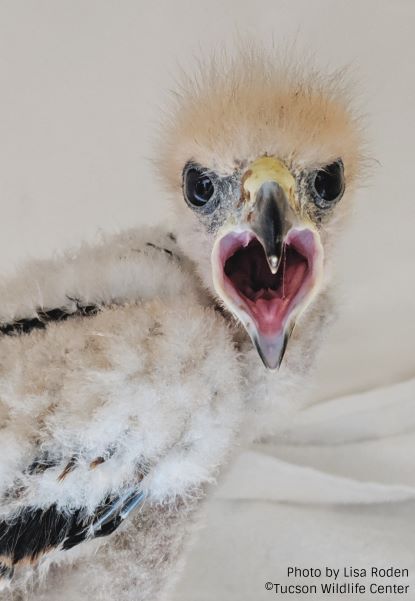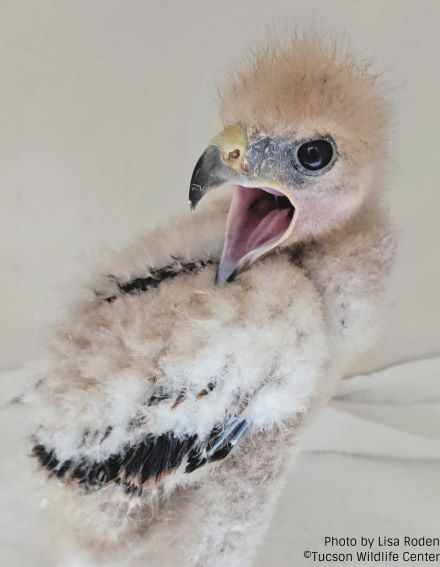

 This outspoken Harris’s hawk hatchling was found on the ground weak and cold. Without fully formed feathers or a comfortable nest to keep her warm, the little hawk was suffering from hypothermia. After checking for injuries, she was placed in the incubator to warm up. It took a couple of days for her to perk up, but she was soon deemed a ravenous eater with a big personality. Less than one week after her fall she was returned to her nest where her parents were waiting.
This outspoken Harris’s hawk hatchling was found on the ground weak and cold. Without fully formed feathers or a comfortable nest to keep her warm, the little hawk was suffering from hypothermia. After checking for injuries, she was placed in the incubator to warm up. It took a couple of days for her to perk up, but she was soon deemed a ravenous eater with a big personality. Less than one week after her fall she was returned to her nest where her parents were waiting.
Over the next few weeks, she will develop her flight feathers and become a fledgling. While she will have some remnants of her fluffy down, her flight feathers will have formed, and she will be ready to leave the nest once again—but this time the right way!
If you find a healthy fledgling, you may provide some water, but please leave them alone and do not feed them. You may spot fledglings on low branches, walls or on the ground while they learn how to fly. But don’t worry—their parents are nearby watching over them. If you suspect an animal needs help, call us at 520-290-WILD (9453) for advice. Someone is available 24/7 for wildlife in need of emergency care.
Click here for more photos.
Summer is here and Tucson Wildlife Center is quickly approaching 3,000 rescues since the beginning of the year! Once again, we are putting out a request for dedicated volunteers to help with the care of these animals until they are ready to be released back into the wild.
If this sounds like something you would like to get involved with, please click on the above tab labeled “how to help”, slide down to “volunteer” fill out and submit the volunteer application. We will get back to you within 24 to 48 hours. Tucson Wildlife Center cannot do what we do without the help of people like you.
Presently, there is a need in all departments, so do not be shy, submit the volunteer application. Thank you in advance for helping us provide the best possible care for Southern Arizona’s sick, injured and orphaned wildlife.


